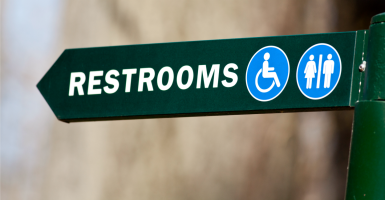South Dakota Gov. Dennis Daugaard, a Republican, vetoed a controversial bill Tuesday that would have prohibited public school students from using bathrooms, lockers, and shower rooms opposite from their biological sex, saying the measure “doesn’t address any pressing issue concerning the school districts of South Dakota.”
Before making his decision, Daugaard met with transgender students and their parents. Meeting them, Daugaard told reporters, “helped me see things through their eyes a little better and see more of their perspective.”
The bill passed overwhelmingly in the South Dakota House and Senate but fell short of securing a veto-proof majority.
State Rep. Fred Deutsch, R-Florence, who sponsored the bill, told The Daily Signal that he wasn’t overly surprised by Daugaard’s decision to veto it.
Over the weekend, Deutsch said, “a number of different businesses came out and said this would reflect poorly on South Dakota if the governor signed it into law.”
“When business starts talking like that, you think, ‘What impact might that have on the governor?’” he said.
Supporters of the legislation argue that the Student Physical Privacy Act would have protected the safety and privacy of all students by ensuring that girls aren’t forced to change or shower in front of biological boys, and vice versa. For students who identify as transgender or as gender non-conforming, the bill would have required school districts to provide a “reasonable accommodation.”
“A reasonable accommodation may include a single-occupancy restroom, a unisex restroom, or the controlled use of a restroom, locker room, or shower room that is designated for use by faculty,”according to the bill, H.B. 1008.
Opponents argued that the measure would discriminate against transgender and gender non-conforming students and would be harmful to them both mentally and physically.
“If I were a student in South Dakota right now, chances are I would not survive into adulthood,” American Civil Liberties Union lawyer Chase Strangio, who identifies as transgender, wrote in an open letter to South Dakota lawmakers last week.
Ryan T. Anderson, the William E. Simon fellow at The Heritage Foundation, said it is “unfortunate” that Daugaard vetoed what Anderson calls a “commonsense bill that protects the rights and interests of all students.”
“Special interests and big businesses effectively lobbied the governor to veto a good bill because of the threats they made,” Anderson said. “Remarkably, the governor justified his veto by claiming that the bill would undermine local control. Nothing could be farther from the truth. It respected local control while ruling out one, and only one, bad option: boys in girls’ bathrooms.”
In a statement explaining his veto, Daugaard said, “[T]his bill seeks to impose statewide standards on ‘every restroom, locker room, and shower room located in a public elementary or secondary school.’”
“It removes,” he added, “the ability of local school districts to determine the most appropriate accommodations for their individual students and replaces that flexibility with a state mandate.”
The Student Physical Privacy Act was a direct response to what conservatives believe is an overreach by the Obama administration. The Department of Education threatened to withhold federal funding from a school district in Cook County, Ill., after a high school resisted giving a biological boy who identifies as a girl unrestrained access to the girls’ showers and locker rooms.
By forcing the transgender student—known in the media as “Student A”—to use a separate locker room, the Department of Education’s Office of Civil Rights ruled, Township High School District 211 had discriminated against the student “on the basis of sex.”
Unless the school changed its policies to allow Student A into the girls’ locker rooms, the education office warned, the district’s federal education dollars could be suspended or terminated for violating Title IX regulations.
Title IX is the federal law that bans discrimination on the basis of sex in any federally funded education program. Experts disagree whether the law applies to transgender persons’ use of opposite-sex facilities, although courts have ruled both ways.
“Because of the pressures put on schools by the federal Department of Education since Title IX was reinterpreted, it’s only a matter of time before we get a transgender student who wants to use the shower room of the opposite biological sex, and all hell will break loose,” Deutsch said. “There’s not going to be parents who will stand for that.”
The purpose of his bill, Deutsch added, “was to prevent that—to establish standards that have been in place since statehood that boys go into boys’ rooms and girls go into girls’ rooms.”
Pro-transgender rights groups such as the American Civil Liberties Union of South Dakota praised the governor’s veto; the ACLU called it a “historic win for equality.”
South Dakota is home to an estimated 1,360 transgender youth ages 13 to 19, according to the Williams Institute, a think tank at the University of California, Los Angeles, School of Law.
An estimated 1.7%, or 1,360, youth in South Dakota identify as transgender. #HiFromSD #SDLeg @SDGovDaugaard pic.twitter.com/eXNcmfka1T
— Williams Institute (@WilliamsPolicy) March 1, 2016
































